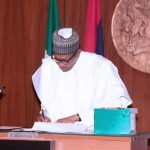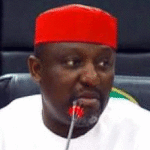OPINION: Buccaneers, Racketeers and Fuel Subsidy Fraudsters
Articles/Opinion, Featured, Featured Contributors/Columnists, Latest Headlines Monday, July 1st, 2019
By Owei Lakemfa
(AFRICAN EXAMINER) – The Emir of Kano, Muhammad Sanusi II descended from his throne last week to deliver his customary blows against subsidies especially for fuel and electricity. The former Central Bank Governor and ex-comrade claimed that Nigerians revel in: “cheap petrol” Based on his flowing gowns and riches, fuel at N145, is cheap. But based on the cost of living, it is quite expensive because the N18,000 National Minimum Wage can only buy 125 litres of petrol.
He delivered his usual homilies: “In 2011, when I was CBN governor, Nigeria made $16bn from petroleum sales, and we spent $8bn importing petroleum and spent another $8.2bn subsidizing the product…and I asked, ‘Is this sustainable?” Certainly it is not. But that is not the basic issue. What is fundamental and which elites like the Emir would either ignore or deemphasize is, why does a country like Nigeria with 62 years of commercial oil production, import fuel? Why should Nigerians be forced to pay ever higher prices because of the incompetence and irresponsibility of the elites who endlessly recycle themselves in government?
As an economist, Sanusi knows that subsidies and the tendency to abuse them, are inherent in our fuel importation. There are two basic elements over which a fuel-importing country, has no control and which make subsidy inevitable. First is the cost of oil at the international market; its endless fluctuation or price volatility can be avoided only if we locally refine petroleum products and provide crude oil at a fixed price for our refineries. Second is the fact that that the Naira is subject to wide fluctuations and continued depreciation. Sanusi accepted this basic fact in his 2011 submission to the ‘Town Hall Meeting’ on subsidy when he said: “We moved from an exchange rate of N118 in 2007 to an exchange rate of N160 today; that exchange rate differential is translated into the cost of petroleum products…” As he is aware, the exchange rate today is N358 to the dollar. So the issue is not lamentations on subsidy, but how to eliminate it by refining locally. Until that is done, there will be subsidy and Nigerians have a right to refuse to pay for such induced subsidy by resisting further fuel price increases. Besides, as Sanusi may agree, importation is a crime against the Nigerian people because local refining gives us lots of other derivable products including diesel, kerosene, asphalt, jet fuel, lubricating oils and petrochemical feedstocks. By importing fuel, we significantly increase costs, export jobs, import poverty, create subsidy, pay subsidy fraudsters, and pick the bill of this criminal chain; fighting this, should be the focus of Emir Sanusi not endless campaigns that Nigerians should pay more for petrol.
Emir Sanusi claimed that: “if the international price of oil goes up, people must be ready to pay more and if it goes down people will benefit.” His claim is not backed by our experience in Nigeria; we have witnessed oil price volatility many times and have almost always come up the worse for it. For instance, the average cost of a barrel of crude oil in 2011 was $94.05 and Nigerians bought fuel at N65 per litre. Five years later, the average cost fell to $43.58 and we bought a litre for N145. So where is the so called benefit of lower oil prices even as the National Minimum Wage remains at N18,000 as it was in 2011? Since we are an import-dependent country, it will apposite to denominate the Minimum Wage in dollars; in that 2011, with the dollar at N160, it was $112.5, today at N358, the Minimum Wage is less than $51! So the Emir’s assertion is incorrect.
The Emir also said: “In 2016, we were told that we are consuming 28 million litres of petrol per day and just a few weeks ago, we were told that it has jerked up to 60 million litres daily; what went wrong?” Nothing went wrong my dear brother; this is a way of justifying more fraudulent subsidy payments. As the Emir should know, this is an old trick played even when he was CBN governor releasing money for these payments. In 2011, then Minister of Finance, Dr. Ngozi Okonjo-Iweala repeatedly told the country that we are consuming 34 million litres of fuel daily, a claim also made before the House of Representatives in 2012 by then Petroleum Minister, Mrs. Allison-Madueke. But the Petroleum Products’ Pricing Regulatory Agency (PPPRA) told the same House that it was paying for 59 million litres a day!
Since the basic means of retailing fuel is through the filing station, we need to ask the Buhari government what is the storage capacity of the functional fuel stations in the country that they can hold and dispense 60 million litres daily?
Recall the PPPRA was established following the 2000 general strike. The idea of the Obasanjo administration was to provide a forum for all stakeholders in the country to determine in a transparent manner, the template on which to base the price of fuel. But the body became a mere rubber stamp of whoever is in power. More tragically, the PPPRA became a fraudulent contraption oiling the subsidy racket, and as the House of Representatives revealed, it was also paying itself fuel subsidy! Its template apart from product and freight costs include compulsory demurrage , and cuts for the NPA, NIMASA, jetties and “marine transport average” plus an “administrative charge” of N18.37 per litre. People like Sanusi are not demanding that the PPPRA contraction should be scrapped, rather, they concentrate on harping that Nigerians pay higher fuel prices.
The fuel subsidy cartel is so powerful that some years ago, when they murdered men of the Customs and Excise for attempting to verify the quantity of fuel imported, nobody was brought to book. Rather, government warned the agency not to inspect ships bringing imported fuel; so such ships were granted immunity! The subsidy loot is also uploaded into politics with some beneficiaries distributing themselves into the main political parties and running for political offices.
When Emir Sanusi argued that the consumption of power and petroleum products are private and should not attract subsidy, I say he is wrong. Government must be interested in power because its availability, accessibility and affordability is fundamental to production and industrialization. As a former comrade, he would recall that the Great Russian Revolution was based on three programmes; peace, bread and the electrification of the country.
Nigeria cannot fight poverty, or industrialize if its artisans, small scale businesses and factories lack electricity or it is too expensive for them. Emir Sanusi needs to join the mass of Nigerians demanding local refining, lower petroleum product prices, efficient, available, accessible and affordable power supply and basic, functional governance.
Related Posts
Short URL: https://www.africanexaminer.com/?p=48824






















